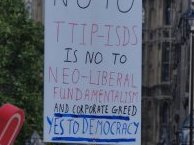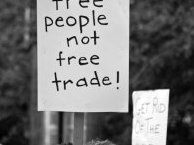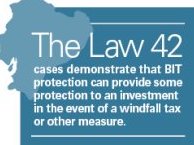Le mécanisme de règlement des différends entre investisseurs et États (RDIE ou ISDS, selon son sigle anglais) désigne une modalité d’arbitrage des conflits émergeant dans le cadre d’accords d’investissement internationaux selon laquelle les entreprises de l’une des parties sont autorisées à poursuivre en justice le gouvernement de l’autre partie. Ceci signifie qu’elles peuvent porter plainte et réclamer des dommages et intérêts. De nombreux traités d’investissement bilatéraux et chapitres sur l’investissement d’ALE incluent des dispositions autorisant ce mécanisme si les bénéfices escomptés par l’investisseur ont été négativement affectés par une mesure prise par le pays hôte, telle que le changement d’une politique publique. Le différend est généralement arbitré non pas par un tribunal public, mais par une cour privée. Ces affaires sont généralement traitées par le Centre international pour le règlement des différends relatifs aux investissements (Banque mondiale), la Chambre de commerce internationale, la Commission des Nations Unies sur le droit commercial ou la Cour internationale de justice.
Le RDIE est un sujet qui suscite à l’heure actuelle un vif intérêt car il cristallise une forte opposition de la part de citoyens préoccupés par les négociations du TTIP entre l’UE et les États-Unis, les discussions sur l’Accord de partenariat transpacifique et l’Accord économique et commercial global entre le Canada et l’UE.










